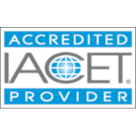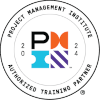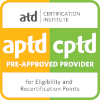Certificate Suite Details
Key Features
- Mobile-friendly
- Audio-enabled
- Badge and credit-awarding
- Real-world case studies
- Fully accessible
- Games & Flashcards
- Expert-supported
- Video content
Certificate Preview
Certificate Description
Learner Feedback
Courses Included in this Certificate
Course Description
This course provides an introduction to business ethics, laying a foundation for how the study of right and wrong can (and should) shape the way organizations conduct business. While everyone within an organization is responsible for upholding high ethical standards, this course will focus specifically on the role that human resources professionals play in establishing and maintaining an ethical culture within an organization. The course addresses the importance of a code of conduct and professional and legal standards within the business organization. It lays out different ethical systems and how they provide frameworks for making ethical decisions.
Course Credits
Course Description
Business leaders, managers, and staff at all levels of an organization will face decisions in their pursuit of moving the business forward—however, some decisions may be easier to navigate than others. When faced with a situation where no clear answer rings out, how do you decide on the best course of action? This course introduces learners to the principles and processes involved in making ethical decisions—that is, making decisions that are based on close examination of different ethical frameworks, the notion of right and wrong, and moral standards. This course pays special attention to situations within the realm of human resources, where upholding an ethical approach to decision making is crucial.
Course Credits
Course Description
Ethical dilemmas confront those in business with the fundamental question: "What's the right thing to do?" But the "right" thing is often difficult to determine and an unexamined patchwork of ideas inform the decision. In order to better understand how to judge right and wrong, this course introduces some foundational ethical systems and explores their implications for business decisions, with a particular focus on the role human resource professionals have in safeguarding ethics in a business environment. Should a business focus on following the rules or on the effects the decision will have? Can self-interest play a role in making an ethical decision? This course presents the ethical theories of utilitarianism, ethical relativism, egoism, and Kantian ethics. It also explores the role religion plays in the development of ethical systems.
Course Credits
Course Description
Because it is the driving force behind economic organizations worldwide, capitalism is a term that business leaders, executives, and employees should know well. Another reason to know this term well: it is at the center of much debate and controversy. At the same time that capitalism is praised for its ability to stimulate innovation and spur economic growth, it is criticized for its contribution to inequality and injustice around the world. This course will explore the topic of capitalism and its relationship to ethics, justice, and inequality.
Course Credits
Course Description
Corporations have a fiduciary responsibility to produce profits for shareholders, but people increasingly believe that corporations have other responsibilities as well. Corporate social responsibility (CSR) recognizes the company's duty to its community, customers, and the environment as well as to shareholder value. This course defines corporations and discusses CSR best practices and important laws, such as the Sarbanes-Oxley Act and the U.S. Foreign Corrupt Practices Act, that constrain some unethical business practices. The course focuses on how the HR department can best support CSR and sustainability.
Course Credits
Course Description
There are certain ethical challenges that employees and organizations are likely to face. Many of these challenges arise due to the commercial nature of business. Business owners and leaders are interested in generating a profit and accruing assets, and because of this, morally troubling situations can be difficult to identify, evaluate, and navigate clearly. This course examines ethical challenges that companies and organizations may encounter and steps for how to address them. While all members of an organization are responsible for promoting and preserving an ethical culture within the organization, this course pays special attention to the role that human resources professionals play in mitigating ethical challenges.
Course Credits
Course Description
Everyone knows that leadership is important in business ethics, but what kind of characteristics does an effective ethical leader have? How should an ethical leader deal with a crisis? Through business scenarios and real-world examples, this course addresses how leaders build ethical organizations. It addresses leadership by example and the practices leaders institute in the organization, including how leaders can effectively deal with a crisis or an ethical lapse.
Course Credits
Course Description
Among the more important ethical obligations of organizations are those that involve the health, safety, and fair treatment of employees. Employers have a moral and ethical obligation to protect employees against discrimination, harassment, and harm. This course reviews common workplace issues and strategies for how to address them. Because human resources professionals play a crucial role in supporting employee well-being, this course pays special attention to the role of HR in preventing and resolving issues in the workplace.
Course Credits
Course Description
Due in large part to advancements in technology, transportation, and trade, businesses now operate in an ever-expanding global economy, where communities and countries rely on one another to buy and sell needed goods and services. While many believe that globalization produces more opportunities for businesses to expand, grow, and profit, others have witnessed tremendous inequalities, harsh working conditions, and the environmental impact of globalization. This course examines the qualities of globalization and the issues and ethical challenges that can arise when businesses and organizations participate in the global economy.
Course Credits
Course Description
Why do ethical people commit unethical acts? While individual morality certainly plays some role in ethical decision-making, the whole is larger than the sum of its parts. Corporate culture is integral to inspiring the best from employees and identifying any ethical problems immediately. HR professionals are critical for building and maintaining an ethical organization, as they are responsible for advertising jobs, screening applicants, and onboarding, training, and monitoring employees. This course lays out the components of an ethical organization with special attention on how HR facilitates the process of building and maintaining an ethical corporate culture.
Course Credits
Notes
This course has an "Ask the Expert" feature, which submits your questions directly to an expert in the field you are studying. Questions are answered as quickly as possible and usually within 24 hours.
As an Accredited Provider, MindEdge offers for its learning events that comply with the Continuing Education and Training Standard.
Learners must achieve an average test score of at least 70% to meet the minimum successful completion requirement and qualify to receive credit. Learners will have three attempts at all graded assessments.
Project Management Institute, , the Registered Education Provider logo, Project Management Professional, , Project Management Body of Knowledge, , Agile Certified Practitioner, -, Risk Management Professional, -, the Talent Triangle, and the Talent Triangle logo are marks of the Project Management Institute, Inc.
Information in this course has been taken from A Guide to the Project Management Body of Knowledge, (® Guide) - Sixth Edition, Project Management Institute Inc., 2017.
The following list outlines the you will earn for completing this course, based on the certifications you have.




